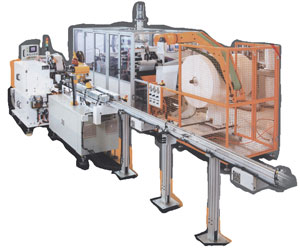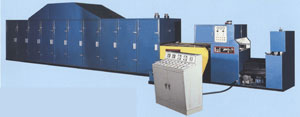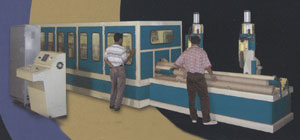Taiwan's Paper-processing Machines Give Buyers An Edge
2009/05/04 | By | CHAN LI MACHINERY CO., LTD.The global economic downturn has been indiscriminate in its fallout, and the paper business certainly hasn't been spared. More than ever, paper producers need cost-cutting machines to help them beat the competition, and Taiwan machine suppliers are answering the call.
Many of the efficiency gains in Taiwan-made paper processing machinery have come from the adoption of computerized control systems and high precision parts. Local companies are also turning out models that can work with recyclable pulp and biodegradable non-toxic additives, earning them points on the eco front. Further cost savings come from energy efficient designs and labor-cutting automation.
The precision gains have also been notable in Taiwan's paper processing machinery sector. Some suppliers on the island have been drawing on a wealth of industry experience to overcome the manifold technical difficulties involved in turning out highly precise, smooth production, durable and power-efficient machines.
Flexible Production
In 2009, Chan Li Machinery Co., Ltd. plans to debut machines that are faster, more automated, and better suitable to flexible production modes, says company vice president Roger Wu. "Our customers are seeking solutions that can help them streamline their workforces and production processes, while allowing them to easily change molds on machines," Wu says.

Wu says that his company may not be Taiwan's No.1 manufacturer of toilet-paper equipment, but it is considered the most important in the segment. Chan Li supplies the machines used by Kimberly-Clark Taiwan to make Scott-branded paper products and Yuen Foong Yu Paper Mfg. Co., Ltd. to make the May Flower-branded household paper products. Despite these two big-ticket orders, however, the Taiwan market accounts for only around 5-10% of the company's sales.
Chan Li also claims to be one of the world's few suppliers of adjustable-type log saws for toilet paper. "Our saw is equipped with a servo motor that enables adjustments to the cutting length in accordance with customers' needs," says Wu. "Our machine also features an outstanding performance level of 180 cuts per minute," he adds.
This year, the company will add a hand-towel machine to its product line and boost the output efficiency of its toilet-paper machines to 80 packs a minute from current 68 packs.

In expanding its product line, Chan Li has remained true to its original focus on equipment for household paper products. "Over past years, we have expanded our product lineup vertically and horizontally to provide a one-stop solution for household-paper equipment needs," Wu says. The company says it can currently supply 80% of all types of paper processing machines, giving it the most comprehensive line in the segment domestically. "Today, we supply not only machines but also whole-plant production planning services and machine sourcing. In a word, our goal is to help customers make money," he stresses.
With the support of a steadily expanding product line, Chan Li has increased revenues by 30% annually over each of the past few years.
To develop automatic machines, the company has been working hard to build up its system integration capability, which enables it to connect individual systems to constitute a complete production line encompassing feeding, slitting, rewinding, folding and packaging stages. "The integration mainly focuses on electromechanical and software systems with the ultimate goal of enhancing automation," stresses Wu.
Wu notes that automation can help paper-product manufacturers cut production costs by reducing labor inputs and improving efficiency. By minimizing human contact with the paper products, highly automated machines also reduce the risk of introducing impurities to products during the manufacturing process, Wu adds.

Wu stresses that while the technological hurdles to machine manufacturing are not so high, system integration poses a real challenge. "We have developed a strong capability in system integration based on over 30 years of experience on the production side," he says. He adds that Chan Li has a team of 20-some R&D personnel, including mechanical engineers and electrical-control specialists.
For budget buyers, the company provides different solutions. "We can supply scaleable individual machines that can be upgraded with new units anytime. The addition is quite simple because we design all of the electromechanical layouts for our machines," Wu says.
On average, the company's machines have a listed output efficiency of 160 meters per minute and 10 to 40 tons per day. They can process paper products in widths ranging from 1.2 meters to 2.3 meters and make papers from recycled and virgin pulp.
The company has registered at least 10 patents over the years and it has some 50 patent applications pending.
As with its machines, efficiency is a focal point of attention for Chan Li on the production front. According to Wu, the company installed a computerized warehousing system and enterprise resource planning (ERP) system in late 2008. "Both will help us considerably cut time spent on searching for spare parts and properly allocating our workforce," Wu explains. He estimates that the new systems will help his company assemble more machines simultaneously on its production lines. "Also, we have begun developing some parts in common specifications for tailor-made machines to keep cost down," he adds.
In addition to its domestic sales, the company exports its machines to the Americas, Europe, the Middle East, mainland China, Australia, New Zealand and other Asian nations. Wu notes mainland China has been one of its fastest-growing markets and he sees bright prospects there over the next few years as China introduces new environmental-protection measures. "The mainland authorities have ordered small paper factories to shut down due to their high level of wastewater discharge from pulp production," he says. "This has forced small-scale pulp buyers to turn to bigger pulp suppliers. But big pulp suppliers are generally not interested in small orders, preferring instead to simply acquire the smaller paper-product makers. As the industry consolidates, demand for automatic production lines like ours will rise," Wu explains.
Wu says his company's business was not much affected by the global financial crisis in 2008. "Paper products are daily necessities, so global consumption hasn't been hit so much," he explains.
Saving Energy and Labor
Package-making machinery specialist Line Shing Machinery Co., Ltd. has its own energy-saving and cost-cutting solutions, including models with automatic control units to reduce the need for labor inputs. The company also supplies an energy-efficient drying system, which company general manager Kinpaleon Tsai claims is up to 30% more energy efficient than machines made by mainland Chinese rivals.
"For customers who need fully automatic production lines, we have the right solutions," Tsai says, referring to systems joining individual machines by conveyers.
The company's drying systems, which bake formed paper products delivered from pulp forming machines, come in gas, electricity and oil powered models. The drying systems can be paired with the company's pulp stock preparation systems, pulp forming systems, and stacking systems to constitute a whole-plant production line for making various paper products, including recyclable industrial package cushions, recyclable table ware and fresh food tray/containers, and recyclable agricultural package products.
The company also designs advanced security functions into its machines, such as a sensor that shuts down operation when abnormalities are detected, Tsai notes.
Tsai says that his machines are not only efficient but sturdy as well. "We have reduced the defective rate in our machines to almost zero," he claims. "Machine breakdowns means additional costs for manufacturers because they have to stop production to fix the problems."
Tsai ascribes his machines' durability mostly to his company's more than 40 years of production experience. "In my industry, dedication and experience decide quality. A substandard machine for making egg trays, for instance, tends to turn out uneven trays that often result in cracked eggs," he says. "Also, an inexperienced manufacturer tends to produce inefficient, energy-guzzling machines that are prone to breakdowns," he adds.
Experience has also been helpful to Line Shing in building up capability in making molds for forming various pulp products. "This is a major asset for us because our customers know that they can continue to access molds for their machines once we move to a new generation of machines. Even today, we still provide molds for machines introduced more than 20 years ago," Tsai says.
Line Shing has invested heavily in equipment mold-making equipment, particularly computer numerical control (CNC) machines. "We are the first Taiwanese manufacturer of pulp-molded product machines to use CNC machines for mold making," Tsai claims. Over the years, Line Shing has built hundreds of molds including pulp-forming molds, thermal-forming molds, tableware molds and industrial-package molds.
In addition to supplying individual machines, Line Shing can provide whole-plant planning and built-to-order manufacturing solutions. According to Tsai, a German machinery manufacturer once contracted Line Shing to design and make machines for it. The company currently supplies 21 machine models. "Worldwide, there are only a few manufacturers in this line that can supply as wide a range of machine types as we can," he claims.
Apart from the economic recession, paper processing makers are under threat from low-cost machines made in mainland China, Tsai says. "The global economic recession has not caused significant demand fluctuation in this market. But mainland China's low-price competition is quite troublesome. However, their costs have surged at least 30% along with their new labor regulations," he adds.
Tsai says that currently there is just one supplier each in Europe and the United States competing for orders with Line Shing in the high-end market. Emerging economies like mainland China, India and Russia are now the most promising markets for his company's machines. Overall, though, Tsai expects the paper machinery market to deteriorate further in 2009 from the 2008 level due to the unfolding economic crisis.
Core Competencies
Taiwan's top supplier and coordinator of whole-plant equipment for making paper cores, Career Industry Corp. recently expanded its product line with the introduction of a seamless paper-tube grinding system.
According to company sales manager Chris Tseng, seamless grinding machines generate much less waste material than seam type machines, significantly reducing operating costs. "There are only a few manufacturers of seamless machines in Taiwan," says Tseng. He claims that his company's seamless grinding machines are designed to turn out extraordinarily long pipes.
The grinding machine can be paired with the company's auto feeding machines, film-coating machines, and drying machines to constitute whole-plant production lines.
Tseng says his company's main production advantage is its technology for making automatic production lines, which are equipped with Siemens-made PLC control units and ABB-made motor control systems. The production line boasts an output efficiency of five to six meters per minute. The company supplies about 12 production lines a year.
Other products supplied by Career Industry include spiral paper core winders, paper roll stand and gluing systems, slitters and rewinders, paper core re-cutters, POY/FDY/DTY/OE finishing machines, angular cardboard making machines, hot-melting glue coating and laminating machines, and paper tube winders.
The company's drying system is a vertical type, which Tseng says turns out perfectly straight and round pipes. "Horizontal machines are good for high-volume output, but they fall short in terms of producing straight and round pipes," Tseng notes. The company's drying system, Tseng reports, can boost the stress resistance of paper cores by an average 15%.
The company's core winders can make pipes up 25mm in wall thickness and one meter in inner pipe diameter.
The company ships its products to domestic and overseas buyers under the "Career" brand. Its major overseas markets are mainland China, Indonesia, Australia, Malaysia, Philippine, Vietnam, Pakistan, Egypt, Jordan, Syria, Bahrain, Lebanon, Russia, Mexico, Chile, and Ecuador.
In Taiwan, the paper cores made by Career's machines have been adopted by major names such as Formosa Plastics Group, Asia Chemical Corporation, Chin Tung Chemical Industrial, Four Pillars Enterprise, Asia Pulp & Paper (APP), New Toyo Int'l Hldgs Ltd., Yunnan Hongta Group, and Rong Sheng Chemical Fibre Group. (Jan. 2009)




